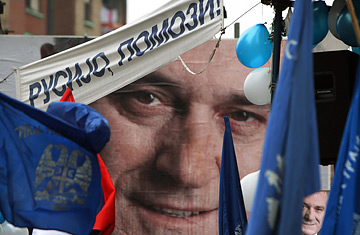
A banner reading "Russia Help Us!" is seen in front of a poster of Tomislav Nikolic in the Kosovo town of Mitrovica.
How much of its pride can a country allow to be punctured? Already punished by the effects of the 1999 Balkan war and international opprobrium, Serbia is in the middle of an election process that will reveal how much more national identity its citizens are willing to shed as they head into the future. Will they opt for an ultra-nationalist President willing to put up a struggle over Kosovo, the so-called historic heartland of the Serb nation that is now dominated by ethnic Albanians about to declare the province's independence? Or will they opt for a President who will not kick up too much of a fuss in order to smooth the country's long but lucrative journey into a European Union adamant that Kosovo be separated from Serbia?
While the presidency of Serbia is a largely ceremonial role, electing the President has become a barometer of popular — and thus political — sentiment. In the first round of voting on Jan. 20, ultra-nationalist candidate Tomislav Nikolic won the most votes, 1.6 million or 39.4% of the ballots cast. The incumbent President, pro-Western Boris Tadic, came in second with 35.4% or 1.4 million votes. The contest is now headed for a Feb. 3 runoff.
Although both Nikolic and Tadic strongly oppose Kosovo's independence, Tadic believes that Serbia should nevertheless strive toward EU membership. Nikolic, on the other hand, wants to freeze diplomatic relations with any country that recognizes Kosovo; he seeks to establish close ties with Russia as an alternative to Europe. During the campaign, he said that if he became President, he would invite Russia to build military bases along Serbia's border with Kosovo.
During the 1999 war, NATO compelled Serbian security forces to pull out of Kosovo, which was then placed under United Nations rule. Kosovo's provisional government, dominated by the province's mostly ethnic Albanian population, is expected to proclaim independence within the next few weeks. Most European Union members and the United States have announced that they will back Kosovo as an independent state, despite fierce opposition by Serbia and Russia.
Concern over disrupting E.U. talks may have beefed up last-minute support for Tadic in Sunday's vote (he had trailed substantially in most pre-election polls). However, Nikolic may have the upper hand in the runoff, particularly because he is expected to receive the support of the Socialist Party, whose candidate got 6% of the vote. Nikolic is a deputy of the Serbian Radical Party leader Vojislav Seselj, who is currently under trial for crimes against humanity for his wartime activity. Both Seselj and Nikolic were close associates of late President Slobodan Milosevic, who died during his own war crimes trial in the Hague in 2006.
"Tadic can only win if he gets sincere support from the Prime Minister Vojislav Kostunica," Goran Svilanovic, a former Serbian Foreign Minister tells TIME. "The key to Serbia's future lies in [Kostunica's] hands." Kostunica, who shares power with Tadic's Democratic Party in the government, could help turn out support for the incumbent from moderate nationalists. However, Kostunica has an uneasy relationship with Tadic; and the Prime Minister's recent rhetoric has become increasingly anti-Western, referring to Western support for Kosovo independence as "ripping out the heart of Serbia." So far, he has refused to comment on the first round's results, or to indicate whom he intends to support.
Even if Nikolic wins the runoff, he will not be able to change Serbian politics dramatically or immediately. Kostunica and his moderate nationalism are likely to hold sway even if he and Tadic decide to call it quits. Kostunica's parliamentary bloc, while numerically small, is an essential ally to any larger party seeking to form a ruling coalition. Meanwhile, parliamentary elections are not scheduled until January 2011. "The government would probably survive, at least for a while, even with Nikolic as President", Svilanovic explains. "But Serbia's road towards the E.U. membership would certainly become much more complicated at best."
